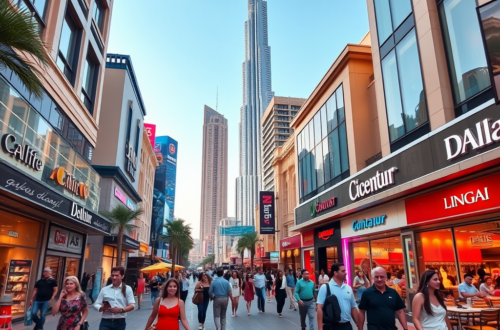Dubai’s property laws are particularly progressive when compared to other Middle Eastern countries, making the emirate a prime destination for real estate investment. Defined by a blend of modern regulations and attractive incentives, Dubai offers expats and foreigners a unique environment that is often contrasted with the more conservative approaches found in other nations in the region. This article delves into the specifics of Dubai’s property laws, highlighting how they stack up against those in neighboring Middle Eastern countries.
Overview of Dubai’s Property Laws

Dubai’s real estate market is governed by laws that promote transparency, security, and ease of ownership. The primary regulations include the Real Estate Regulatory Agency (RERA) rules, which ensure buyer protection and enhance market governance. Key features of Dubai’s property laws are:
- Freehold ownership options for expatriates in designated areas.
- Comprehensive guidelines for rental agreements and tenant rights.
- Strict procedures for property registration and transfers.
- Accessibility of property investment for non-residents.
- Attractive financing options through local banks and financial institutions.
These elements emphasize a proactive approach to property law that sets Dubai apart from many of its regional peers.
Comparative Analysis with Other Middle Eastern Countries

When examining property laws across the Middle East, several countries adopt different principles that influence the real estate landscape. Here’s a breakdown of how Dubai compares with some noteworthy examples:
Saudi Arabia
In Saudi Arabia, property ownership has historically been restricted, especially for non-nationals. However, recent reforms have introduced more liberal regulations, allowing foreigners to own land in specific zones, primarily for residential purposes. Yet, the process can be cumbersome and is marked by bureaucratic hurdles. In contrast, Dubai offers straightforward ownership structures that significantly reduce the red tape associated with property purchases.
Kuwait
Kuwait’s property laws are also restrictive towards foreign ownership, limiting ownership to only specific areas and requiring a lengthy application process for expats. In comparison, Dubai outshines Kuwait by providing a wider array of opportunities for property acquisition without extensive procedural delays.
Qatar
Qatar allows foreign property ownership in designated areas but enforces strict legalities related to rental income and property management. While both Dubai and Qatar are keen on attracting foreign investment, Dubai’s more streamlined legal framework and investor-friendly regulations tend to offer a less complicated experience than those experienced in Qatar.
Investor Protections and Rights in Dubai
Dubai’s property laws heavily focus on investor safety, which includes robust protections for buyers. The established laws are designed to safeguard investments and ensure that the interests of both developers and property investors are upheld:
- Mandatory escrow accounts for developers to ensure funds are used for the intended project.
- The right to cancel a property purchase agreement under specific conditions.
- Clear dispute resolution mechanisms through the Rental Disputes Center.
These protections foster a supportive environment for both local and foreign investors, creating a level of trust that is not always echoed in the regulations of other Middle Eastern nations.
The Future of Property Laws in the Region
As countries in the Middle East look to diversify their economies and attract foreign investment, many are reevaluating their property laws. The trend leans toward liberalization, but the extent to which these laws evolve varies significantly from one country to another. While Dubai leads the charge with its proactive measures, neighboring nations may follow suit in enhancing their legal frameworks to remain competitive and appealing to foreign investors.
Conclusion
In summation, Dubai’s property laws are notably more flexible and investor-friendly compared to many of its Middle Eastern counterparts. The emphasis on transparent regulations, investor protections, and streamlined processes has positioned Dubai as a standout option for real estate investments in the region. As other countries strive to adapt and improve their laws to entice foreign interest, Dubai will likely remain a leading hub for property ownership in the Middle East.
Frequently Asked Questions
- Can foreigners buy property in Dubai? Yes, foreigners can buy property in designated freehold areas in Dubai.
- What protections do buyers have in Dubai? Buyers are protected through mandatory escrow accounts, rights to cancel transactions, and access to dispute resolution mechanisms.
- How do property laws in Saudi Arabia differ from those in Dubai? Saudi Arabia has historically restricted foreign ownership more than Dubai, though recent reforms are gradually changing this dynamic.
- Are rental agreements secure for tenants in Dubai? Yes, rental agreements in Dubai are governed by clear laws that protect tenant rights significantly.
- What is the future outlook for property laws in the Middle East? The trend suggests a movement toward more liberalized and investor-friendly property laws across the region.





